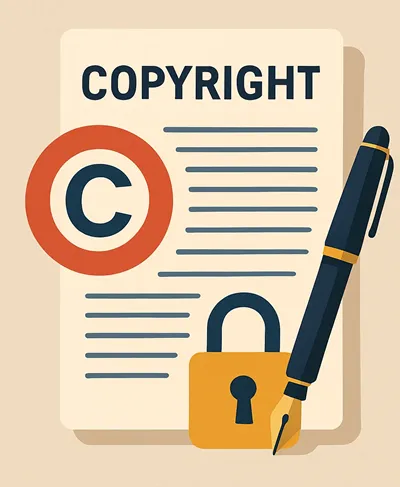
The Copyright Act, 1957 protects the original creations of authors, artists, musicians, filmmakers, and software developers in India. It ensures that no one can copy, reproduce, or distribute your work without permission. The moment you create something original and record it — by writing, filming, coding, or recording — copyright automatically exists.
Key Highlights
What It Covers
- Books, poems, articles
- Songs, music, lyrics
- Films, photos, paintings, designs
- Software and computer programs
- Architectural works
Automatic Protection
No registration is required — the protection starts as soon as the work is created and fixed in a tangible form. (Registration helps in proving ownership in case of a dispute.)
Duration of Copyright
- For individuals: Lifetime of the creator + 60 years after death
- For companies/films/music/software: 60 years from the year of publication
Rights of the Creator
- Reproduce or copy the work
- Publish and distribute
- Perform or broadcast publicly
- Translate or adapt
- License or sell the work
Infringement & Penalties
Using someone's work without permission can result in:
- Fine: ₹50,000 to ₹2,00,000 per infringement
- Imprisonment: 6 months to 3 years
- Confiscation of infringing copies and materials
Where & How to Apply for Copyright Registration
Where to Apply
Official Portal: https://copyright.gov.in (Ministry of Commerce & Industry, Government of India)
Online Application Process
- Go to the official Copyright Office portal.
- Create an account and log in.
- Choose the category of your work (literary, musical, artistic, cinematographic, etc.).
- Upload your work (soft copy, sample, or recording).
- Fill in details like your name, contact, and nature of the work.
- Pay the fee online (usually ₹500–₹2,000 depending on the type of work).
- You'll receive a Diary Number as acknowledgement.
- The application is examined by the Registrar.
- If no objections are received, you'll get the Copyright Registration Certificate by email.
Documents Required
- Soft copy of the work
- ID proof of the applicant
- NOC from co-authors or publishers (if any)
- Power of Attorney (if filed through an agent)
- Fee payment receipt
Government Fee Structure (as per copyright.gov.in)
| Type of Work | Fee (₹) |
|---|---|
| Literary, Dramatic, or Artistic Work | ₹500 |
| Musical Work | ₹2,000 |
| Cinematograph Film | ₹5,000 |
| Sound Recording | ₹2,000 |
| Software/Computer Program | ₹5,000 |
Quick Takeaway
| Feature | Details |
|---|---|
| Law | Copyright Act, 1957 |
| Authority | Copyright Office, Delhi (DIPP, Govt. of India) |
| Portal | copyright.gov.in |
| Protection Starts | Automatically on creation |
| Duration | Creator's life + 60 years |
| Penalty for Violation | ₹50,000–₹2 lakh + up to 3 years' jail |
Copyright Act, 1957 – FAQs
-
1. Do I need to register my work for protection?
-
No, copyright exists automatically, but registration helps prove ownership in disputes.
-
2. Can I copyright my blog or YouTube video?
-
Yes, if it's your original work.
-
3. Can I use a song if I give credit to the singer?
-
No. Permission or license is mandatory.
-
4. Is it okay to use Google images for projects?
-
Only if marked as "free to use" or under a Creative Commons licence.
-
5. Does my software code get protection?
-
Yes, software and source code are covered as literary works.
-
6. Can I remix or remake a song legally?
-
Only with a written license from the original copyright holder.
-
7. What is "fair use"?
-
Limited use for education, criticism, news reporting, or review—without harming the creator's rights.
-
8. Can I register a logo under copyright?
-
Yes, but logos are usually better protected as trademarks too.
-
9. How long does it take to get registration?
-
About 2–3 months if there are no objections.
-
10. Is registration compulsory for filing a case?
-
Not compulsory, but courts prefer it as proof.
-
11. Can I transfer my copyright?
-
Yes, through a written agreement or licensing contract.
-
12. Can two people own a copyright jointly?
-
Yes, co-authors share equal rights unless agreed otherwise.
-
13. Can I use old songs or books freely?
-
Only after 60 years from the death of the creator (public domain).
-
14. What if someone steals my idea?
-
Copyright protects expression, not ideas. You must have a recorded or written version.
-
15. Can I sell my copyright?
-
Yes. You can assign or license it for royalties or one-time payment.
-
16. Is my work protected abroad?
-
Yes. India is part of international copyright treaties (like the Berne Convention).
-
17. Can I stop someone from translating my book?
-
Yes, translation rights belong to the original author.
-
18. What if someone copies my YouTube video?
-
File a copyright complaint under YouTube's "Copyright Takedown" system and/or with the Registrar.
-
19. What is the validity period after the author's death?
-
60 years post death of the creator.
-
20. Can I register online myself or need a lawyer?
-
You can do it yourself through copyright.gov.in; no lawyer is needed.
Add new comment